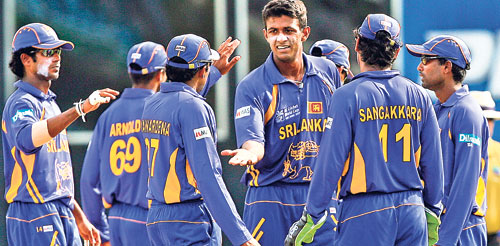
Cricket lessons for economic management
Being the runner-up in the Cricket World Cup is an admirable achievement. This was possible owing to our cricket being managed in a professional manner. There are several significant lessons from Sri Lanka Cricket that is relevant for the management of the economy. What are the important lessons from cricket for the economy? Foremost among those lessons is that the process of selection of the team was on the basis of merit. This columnist may have chosen a slightly different squad, as well as rotated the squad much more than was done by the selectors. Nonetheless, there is no doubt that the team was selected on the basis of merit. Sri Lanka was represented by its pluralistic elements of language, religion and culture. The team performed as a united composition and these diverse elements were of no consequence. The SL team is also a perfect example of the old adage: 'the whole is greater than the sum of its parts'. We are not by any means arguing that the team or any other national endeavour should be represented by all the constituent elements, Certainly not. There would have been no harm if the entire team consisted of Tamils or Sinhalese or Muslims, provided the choice was done on the basis of merit. Had we been represented by a non- Sinhala Buddhist team, a truly pluralistic society would have accepted such a representation based on merit. Equally true the team could have consisted entirely of Sinhala Buddhists chosen on the basis of their cricketing prowess and the others would have accepted such a choice, if the criterion for selection was merit. In a pluralistic society such as ours, the probability of representation of many of the constituent elements is high when the choice is on the basis of merit. What the country must never opt for is a quota system based on population proportions. It would certainly kill incentive, breed mediocrity and chase away excellence. The second attribute we need to emulate is the professionalism in Sri Lanka Cricket. Each player performs his task professionally, seeking assistance to correct weaknesses, advice on improving skills are provided from the best of coaches. Tom Moody is ranked among the best of cricket coaches and Trevor Penny among the best of fielding coaches ranking on par or better than Jonty Rhodes of South Africa. This shows that we are prepared to access the best of international skills for the improvement of our cricket. This is not so when it comes to very many other areas of economic activity. When will our institutions operate on a professional basis, especially those in the public sector? Poor work-ethic has been a fundamental weakness in our society. The output per worker is low and this reflects in the costs of production and consequently affects the country's competitiveness in international markets. In order to compensate for low productivity, adjustments are being made in the exchange rate. The much superior work-ethic of countries like China and Vietnam could affect our export competitiveness seriously. In contrast to much of our economic activities, the cricket team plays hard. There is no scope for relaxation and lethargy on the field. A few moments of ineptitude could cost a match. This " play-ethic" should be transferred from the playing field to the factory and office. What a difference that would make to our productivity, economic growth and development. A closely related attribute in cricket is the insistence on punctuality. A cricket match begins exactly on time, neither a minute earlier nor a minute late. If the fielders arrive on the field early and are ready to play a minute earlier, they have to wait till the hands of the clock reach the appointed time. They have to bowl the overs within a time period and suffer heavy fines if they don't. International cricket commentaries too are meticulously timed. Time is the most scarce resource and a waste of time is a waste of valuable resources; capital, labour and management. Can we say that in our economic and cultural activities that we are punctual, as in cricket? If only there is an improvement in punctuality and time management, the country's output of goods and services would be enhanced by a handsome degree. Regrettably, the waste of time at all levels of economic activity in the country is horrendous. Another significant development in the country's cricket has been its democratisation over time. No longer do the cricketers come predominantly from elite Colombo schools or even from Colombo or the Western Province. That has added great strength to the cricket team. The stars: Sanath Jayasuriya, Lasith Malinga, Upul Tharanga are from the deep south, Murali and Sangakkara from the hill capital and the others can hardly be described as from elite schools. This process of selection from widespread areas is another secret to its strength. Even though ours is a team selected from a mere 20 million it crushed the Indian team selected from among 1.2 billion. If only these lessons of selection on merit, professionalism, punctuality, democratisation and a pluralistic representation could be applied in our economic management, the country's productivity could be improved immeasurably. Without such a transformation the rapid economic growth that we dream of will remain a mirage, as in the past. Can this small nation state perform at the world's highest levels as in her cricket? |
|| Front
Page | News | Editorial | Columns | Sports | Plus | Financial
Times | International | Mirror | TV
Times | Funday
Times || |
| |
Copyright
2007 Wijeya
Newspapers Ltd.Colombo. Sri Lanka. |
